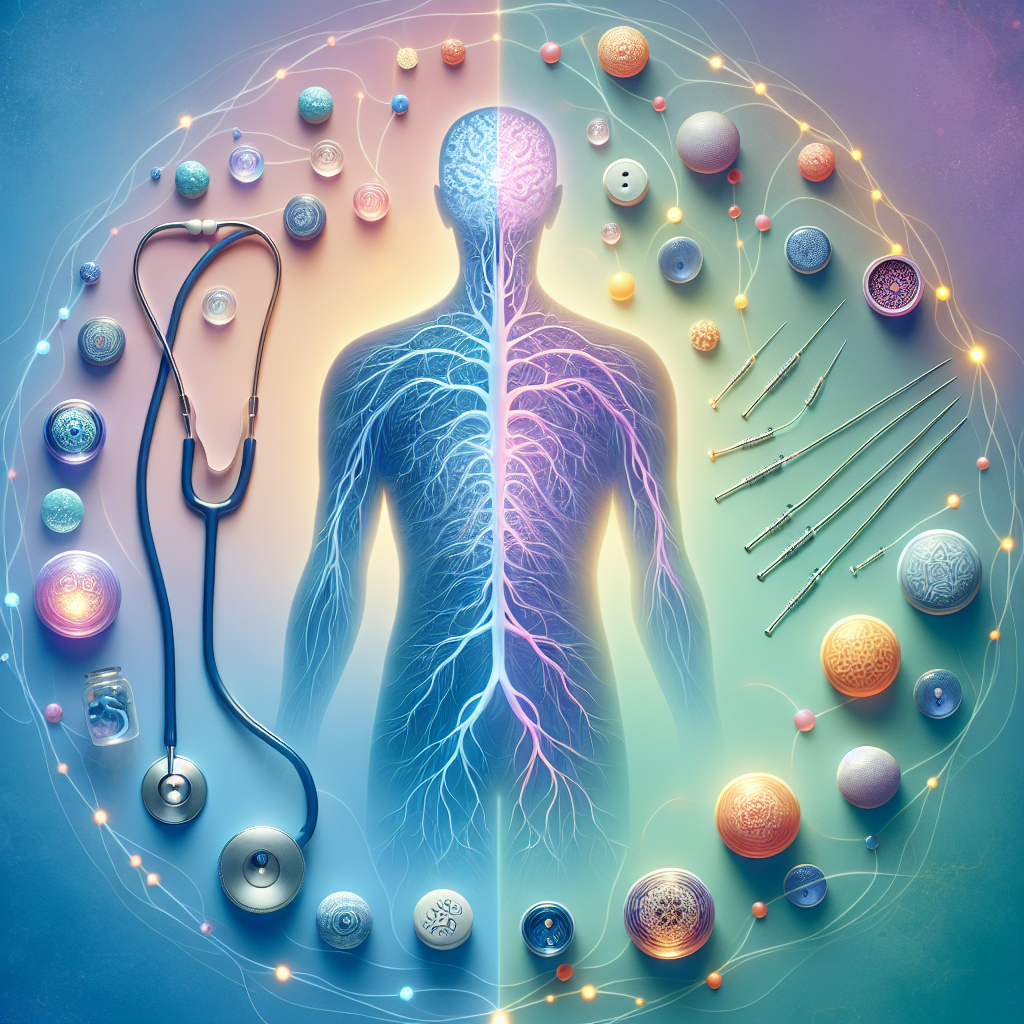Navigating Neuropathy: Integrative Approaches to Healing Through Western Medicine and Eastern Traditions
Neuropathy is a complex and often debilitating condition characterized by damage to the peripheral nerves, leading to symptoms such as pain, numbness, tingling, and weakness, primarily in the hands and feet. The etiology of neuropathy is diverse, encompassing diabetes, infections, traumatic injuries, and autoimmune diseases. Given the multifaceted nature of this condition, treatment approaches vary significantly between Western medicine and Eastern traditions. This article delves into the integrative approaches to healing neuropathy, comparing and contrasting the respective treatment methodologies of Western medicine and Eastern practices.
Western Medicine: Evidence-Based and Targeted Therapies
Diagnosis and Initial Assessment
Western medicine relies heavily on diagnostic tools to pinpoint the underlying cause of neuropathy. This typically involves a combination of clinical evaluations, blood tests, imaging studies, and nerve conduction tests. Identifying the root cause is crucial for developing a targeted treatment plan.
Pharmacological Interventions
The cornerstone of neuropathy management in Western medicine is pharmacological treatment. Medications used include:
– Pain Relievers: Over-the-counter pain medications like nonsteroidal anti-inflammatory drugs (NSAIDs) or prescription opioids for severe pain.
– Antidepressants: Tricyclic antidepressants (e.g., amitriptyline) and serotonin-norepinephrine reuptake inhibitors (e.g., duloxetine) are often prescribed for their pain-modulating effects.
– Anticonvulsants: Drugs such as gabapentin and pregabalin are commonly used to manage neuropathic pain.
Physical Therapy
Physical therapy plays a vital role in managing symptoms and improving the quality of life. Exercises aimed at strengthening muscles, improving coordination, and enhancing balance can alleviate some of the physical limitations imposed by neuropathy.
Lifestyle Modifications
In cases like diabetic neuropathy, lifestyle changes such as improved glycemic control, a balanced diet, and regular exercise are integral to managing the condition. Smoking cessation and alcohol moderation are also recommended to mitigate nerve damage.
Advanced Interventions
For refractory cases, more advanced interventions are considered:
– Nerve Blocks: Local anesthetics or steroids are injected near nerves to reduce pain.
– Transcutaneous Electrical Nerve Stimulation (TENS): This involves using electrical impulses to alleviate pain.
– Surgical Options: In severe cases, surgical interventions such as decompression surgery may be necessary to relieve nerve pressure.
Eastern Traditions: Holistic and Balancing Approaches
Traditional Chinese Medicine (TCM)
TCM views neuropathy through the lens of energy imbalances and disruptions in the flow of Qi (vital energy). Several modalities are employed to restore balance:
– Acupuncture: This ancient practice involves inserting fine needles into specific points on the body to stimulate healing and pain relief. Research has shown that acupuncture can enhance blood flow, release endorphins, and modulate pain pathways.
– Herbal Medicine: TCM practitioners prescribe custom herbal formulations tailored to the individual’s constitution and symptoms. Common herbs used include astragalus, rehmannia, and peony.
– Cupping and Moxibustion: These techniques involve the application of heat or suction to specific areas of the body to improve circulation and alleviate pain.
Ayurveda
Ayurveda, the traditional system of medicine from India, emphasizes the balance of the body’s three doshas (Vata, Pitta, and Kapha) for health and well-being. Ayurvedic approaches to neuropathy include:
– Herbal Remedies: Ayurvedic herbs such as ashwagandha, turmeric, and guggul are used for their anti-inflammatory and neuroprotective properties.
– Panchakarma: This detoxification process involves a series of treatments, including massage, herbal steam baths, and enemas, aimed at cleansing the body and restoring balance.
– Diet and Lifestyle: Ayurvedic practitioners recommend dietary adjustments based on one’s dosha, along with yoga and meditation to promote overall health.
Integrative Approaches: Bridging the Gap
The growing recognition of the benefits of integrative medicine has led to a more holistic approach to treating neuropathy, combining the strengths of both Western and Eastern traditions.
Complementary Therapies
– Mind-Body Practices: Techniques such as mindfulness meditation, tai chi, and qigong have been shown to reduce stress and improve pain management, making them valuable adjuncts to conventional treatments.
– Nutritional Supplements: Omega-3 fatty acids, alpha-lipoic acid, and B vitamins are often recommended for their neuroprotective and anti-inflammatory effects.
Personalized Care
Integrative medicine emphasizes personalized care, recognizing that each patient’s experience of neuropathy is unique. This approach considers the physical, emotional, and spiritual aspects of healing, ensuring a more comprehensive treatment plan.
Collaborative Care
Collaboration between healthcare providers from different disciplines can enhance patient outcomes. For instance, a patient might receive pharmacological treatment from a neurologist, physical therapy from a physiotherapist, and acupuncture from a TCM practitioner, all working together to address different facets of the condition.
Conclusion
Navigating neuropathy requires a multifaceted approach that addresses not only the physical symptoms but also the underlying causes and overall well-being of the patient. Western medicine offers targeted, evidence-based treatments that can effectively manage symptoms and improve quality of life. In contrast, Eastern traditions provide holistic, individualized therapies that can complement conventional treatments and promote overall balance.
The integration of these diverse approaches holds the promise of more effective and comprehensive care for individuals suffering from neuropathy. By combining the strengths of Western medicine and Eastern traditions, healthcare providers can offer a more personalized and holistic path to healing, ultimately enhancing the well-being of those affected by this challenging condition.

